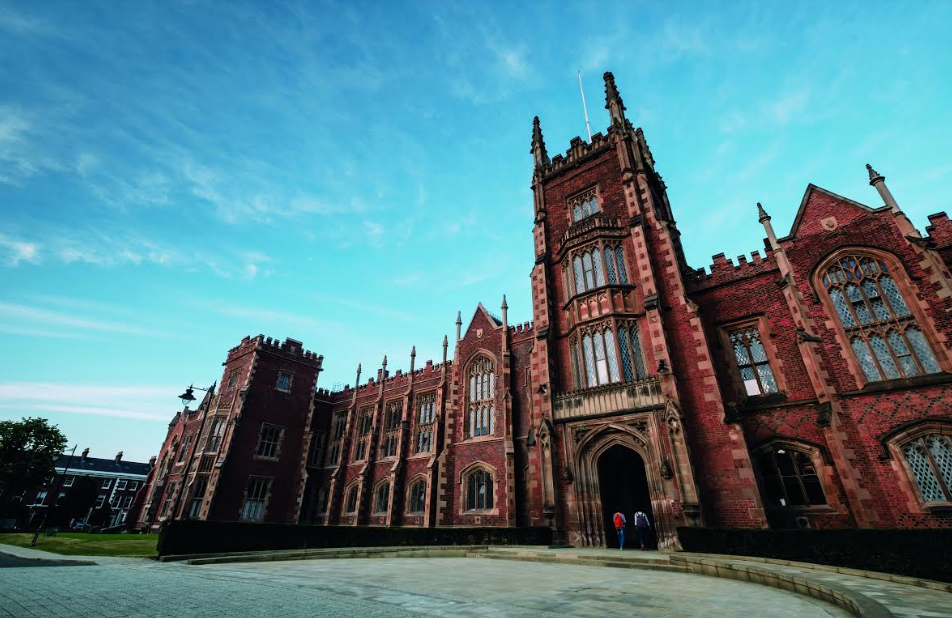Queen’s University Belfast one of the leading universities in the UK and Ireland and a member of the prestigious Russell Group of UK research intensive universities recently showcased its courses in an event in Bengaluru.
Professor Ian Greer, Vice-Chancellor of Queen’s University Belfast has had a long spanning career with reputed institutes and Universities across UK. He was a member of the UK Government’s Office for Life Sciences Industrial Strategy Board that developed the UK’s Life Sciences Industrial Strategy that was published in August 2017. He tells us about why Indian students can develop an edge by studying in Queen’s University Belfast.
What brings you to India?
Queen’s University Belfast has a long-standing relationship with India – one of the world’s fastest-developing countries. There are around 200 Indian students at Queen’s, across all study levels and many programmes. They are mainly in programmes with an integrated placement option – helping to create industry-ready graduates. We are a Global University and are committed to attracting the best talent in the world. We feel that Indian students have an excellent schooling system and are generally very good academically. Queen’s University Belfast is committed to building partnerships and creating new opportunities in India. We will continue to nurture and grow partnerships that already exist and help to build new ones. We are creating opportunities that will secure the future of a new generation of students – opportunities that will lead to success for them and the companies that employ them.
How do you believe that Queen’s University’s programmes will help Indian students?
Our focus remains on employability for Indian students. We have introduced many new interventions for Indian students such as admission through JEE scores, a business summer-school for high school students giving them an opportunity to experience Queen’s University and Belfast for ten days, various scholarships, Indian based admission assistance and Internship Programmes for students. Our courses are very popular with Indian students which include Computer science, business, engineering, law, medicine and many more. With this, we aim to help aspirants who are looking at studying and gaining professional experience in the UK as well as other parts of the world.
What are some of the key initiatives for India?
IIT JEE results acceptance by Queen’ University Belfast means inclusion of Joint Entrance Exam (JEE) scores in the admission criteria for engineering programmes (science and technology) conducted in India. We have signed a MoU with Tezpur University Assam to explore mutually beneficial opportunities over the next five-year period, specifically in the areas of joint supervised doctoral programmes. There will also be opportunities for student and staff exchange for the purposes of study, research and teaching. We have introduced school scholarship for the UG students as part of their UG initiative for September 2019 intake. The scholarship is worth GBP 7,500. A business summer school for Indian high school students to experience Queen’s University and Belfast for few days is taking place between 13th and 22nd June 2020. The InStep Internship Programme was created by N.R. Narayana Murthy, Founder, Infosys has since 2011 had 40 undergraduate students from the School EEECS taken summer internships at Infosys, India across two campuses, Bangalore and Pune.
Please tell us about the changes in visa policy for Indian students to study in UK and how Queen’s University is perusing Indian students to come and study at the University?
We are delighted with the announcement regarding a two-year post-study work visa for Indian students. The creation of a new two-year post-study work visa route will now further encourage Indian students to opt for the UK for higher studies enabling them to stay in the United Kingdom for two years to find long-term employment after studying and continue to build their links within the UK. We are taking initiatives to nurture Indian students to enable them to reach their potential within the global workplace. This change in policy will have many benefits for a wide range of employers, both locally and globally, as they can access talented graduates from across the world. It also will enhance the ability of all UK universities to compete in terms of international student recruitment and subsequently enrich the experience of UK students who will enjoy the benefits of a diverse student body. Independent research commissioned by Queen’s found that every eight international Queen’s undergraduate students create £1 million of economic impact, helping to fuel our economy. They also bring a wider benefit to our academic and civic communities.

What is the kind of courses that Indian students can take? What are the selection criteria you have?
The most popular courses for Indian students typically fall within three broad subject areas: Engineering, Health Sciences and Business. However, in more recent years, there has notably been increasing diversity with students choosing Psychology, Law and English Literature. At an undergraduate level, many of our Indian students are pursuing Medicine or Engineering programmes, including Mechanical, Aerospace and Computer Sciences. Programmes such as Business Management, Economics and Physics have also proven to be very popular. At a postgraduate Master’s level, some students opt for programmes with an optional one year integrated placement because of their desire to gain professional experience. These include Applied Cyber Security, Construction and Project Management and International Business Law. Other popular programmes include Data Analytics, Molecular Biology & Biotechnology and Accounting & Finance. At a PhD doctoral level, the interest areas are quite varied covering Pharmacy, Medicine, Law and Engineering, very much aligning with the University’s key research strengths.
What are the advantages of studying at Queen’s University?
Firstly, I would like to highlight that the UK is one of the most popular destinations, pertaining to its rich history, culture, proven academic excellence and great living conditions. When planning to study abroad, the major problem faced by most of the students is affordability. The university offer several advantages apart from the education front. And, Belfast is more affordable than any other major student city in the UK and was found to have the lowest student rent in the UK in 2018 (Natwest Student Living Index). Queen’s University Belfast is one of the oldest universities in the UK which is considered one of the most beautiful. It is in the top 180 universities in the world (QS World University rankings 2019).
What is the fee structure like? Do you offer scholarships for Indian students? Please elaborate.
The University offers a range of scholarships, ranging from partial to full and across all study levels, supporting students to fulfil their academic potential. Additionally, and exclusively for India, we are offering 50 merit-based scholarships which will be awarded to high-achieving year 12 students who will commence undergraduate studies in 2020. As an institution, Queen’s is fully committed to assisting students from all around the world achieve their ambitions and we recognise the critical importance that scholarships play in the decision-making process.
What are the employment opportunities created by the Queen’s University for its students?
Employability is a central element at Queen’s University for undergraduate and postgraduate courses. At Queen’s 96% of our students are in employment or further study six months after graduation. Graduate opportunities specific local companies like First Derivatives have an explorer programme specifically for international students. International Student Employability Programme feeds into the Degree Plus accreditation. In October 2019 Queen’s submitted two applications for the UKIERI Mobility Programme: Study in India. This is a new initiative to increase outward student mobility from the UK, enhance the employability of UK graduates and support the internationalisation of Indian higher education institutions. The two proposals are for short programmes for approximately 25 Queen’s students in Pharmaceutical Sciences/Chemistry and AHSS, collaborating with Manipal Academy of Higher Education and OP Jindal Global University respectively. Application outcomes will be released on 18 December 2019. Tech Trainees is the British Council’s Tier 5 Visa sponsorship service that allows international students to remain in the UK after graduation to work in UK companies in Science, Technology, Engineering, Mathematics (STEM) and Applied Arts fields. We are offering PGT courses at Queen’s University which come with a 1-year internship.
What are your future plans for the University?
In coming years, we plan to partner with Indian institutions and several outreach programmes are among the planned strategies for the five-year plan. We are also interested in developing research partnerships with Indian businesses and universities. We believe it is important for students to pursue education in environment rich and high-quality research to ensure that students are cutting edge at their discipline and are taught by people who are at the forefront of their subject area.
This story first appeared in Sakal Times dated Nov 19, 2019 here:

